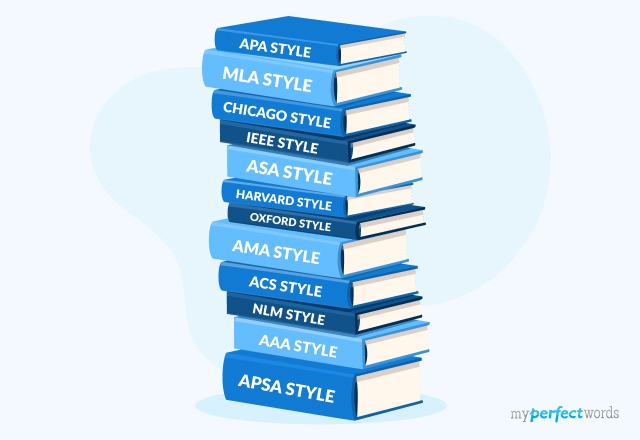What is Chicago Style Citation?
Chicago style citation is a widely-used system for documenting sources and providing references in academic and professional writing. It is commonly used in the fields of history, literature, and the arts, but it's also applied in various other disciplines.
The Chicago Manual of Style (CMOS) is the authoritative guide that outlines the rules and conventions for this citation style.
There are two primary citation formats within the Chicago style: the Notes and Bibliography System and the Author-Date System.
Each has its own set of guidelines for citing sources, allowing writers to choose the one that best suits their research or the requirements of their publication.
Notes and Bibliography System
In this system, sources are cited through footnotes or endnotes, accompanied by a bibliography at the end of the document.
These notes include full publication details and page numbers for direct quotations. It's commonly used in the humanities
Author-Date System
The Author-Date System, on the other hand, incorporates brief in-text citations within the body of the text, and a corresponding reference list at the end of the document.
This style is often preferred in the natural and social sciences.
Chicago style citations are characterized by their attention to detail, providing readers with all the necessary information to locate the cited sources.
Whether you're citing books, journal articles, websites, or other types of materials, Chicago style offers specific formats and guidelines for each.
Citation styles can be complex. If you're looking to find a quick fix, our professional essay writing service is here to deliver perfectly formatted essays.
Chicago Style Format
Chicago style formatting encompasses a set of rules and guidelines for structuring written documents, including research papers, essays, and theses.
It defines how your paper should appear, covering aspects like margins, font, spacing, and the arrangement of headings and subheadings.
This format maintains consistency and readability, which is crucial for academic and professional documents.
Key Elements of Chicago Style Formatting
- Title Page: Chicago style often requires a title page with the title of the paper, your name, the course, instructor's name, and the date.
- Margins and Font: Typically, one-inch margins are used, and the preferred font is Times New Roman or another readable serif font.
- Page Numbers: Page numbers are placed in the header or footer, usually in the top right corner.
- Spacing: Double-spacing is standard for most of the text, with exceptions for block quotations, footnotes, and bibliography entries.
- Headings: It includes different levels of headings and subheadings to structure the content. These are formatted with specific capitalization and placement rules.
- Footnotes or Endnotes: Depending on the chosen citation system, you may include footnotes at the bottom of the page or endnotes at the end of the document to cite sources and provide additional information.
- Bibliography or Reference List: A comprehensive list of all sources cited in your work should be included at the end of your document. The format for bibliography entries depends on the type of source (e.g., books, articles, websites).
How to Do Chicago Style Citation?
Chicago style citation involves specific guidelines for citing sources unlike APA and MLA style in academic writing. In this section, we will explore how to accurately cite various sources in your academic work.
For a complete and detailed explanation, refer to the following sections:
Chicago Style Title Page
A Chicago style title page should be structured with precision, presenting essential information in a standardized format. Here's what you need to include:
- Title of the Paper: The title should be concise, informative, and centered at the top of the page. It's often positioned about one-third of the way down from the top margin.
- Your Name: Your full name is placed a few lines below the title, centered on the page.
- Course Information: Include the course name or number and the name of the course instructor. This information is typically centered below your name.
- Date: The date, often the submission date, is positioned several lines below the course information and is typically centered.
The Impact of Climate Change on Biodiversity: A Comprehensive Analysis An Examination of Global Environmental Trends John A. Smith University of Chicago ENVS 301: Environmental Science Professor Emily Johnson November 15, 2023 |
Chicago Style Heading
Use title case capitalization for all the headings. If your paper has different levels of heading like the main chapters and sections then make it obvious for the readers.
However, make sure that you use the same style and font for all the same level headings. For example, all the main headings should have the same style. And the sections and subheadings should have the same style and size.
Chicago Style Citation Bibliography and References
Chicago references and bibliography lists are not as double-spaced as the other text. Instead, you will need to leave a blank line between the entries. In case any entry continues to the next line then the next line will be ½ inch indented.
If you want to create an annotated bibliography, you will follow the same formatting style as for the bibliography. However, the annotation under each source will be indented and double-spaced.
Book: Example: Smith, John A. The History of Environmental Science. Chicago: University of Chicago Press, 2010. |
Journal Article: Example: Doe, Jane R. "Climate Change and Its Impact." Environmental Studies Quarterly 25, no. 3 (2015): 112-130. |
Website: Example: Johnson, Mark. "Sustainable Practices for a Greener Future." GreenLiving.com. April 5, 2022. https://www.greenliving.com/sustainable-practices. |
Chicago Style Footnote Citation
Footnotes are placed at the bottom of each page and in the same font size as all the text. Usually, it is added with a specific word, name, or phrase. Clicking on the superscript number takes the reader to the bottom of the page.
To create the footnote, use Word’s automatic footnotes function.
Chicago Style Footnote Citation for Book: John A. Smith, The History of Environmental Science (Chicago: University of Chicago Press, 2010), 45. |
Chicago Style Citation Examples
Chicago style citation, whether using the Notes and Bibliography System or the Author-Date System, follows specific guidelines for citing various types of sources. These examples illustrate how to format citations for common source types:
Chicago Style in-Text Citations
Suppose you're writing a research paper and you reference a book written by Jane Doe titled "The Art of Writing." In this system, you would use a footnote or endnote like this:
"Writing is a complex craft with numerous intricacies."¹ In the corresponding footnote or endnote: ¹ Jane Doe, The Art of Writing (Chicago: XYZ Publishers, 2020), 45. |
In this example, the superscript "¹" in the text corresponds to the full citation in the footnote or endnote, providing all the necessary details for the reader to locate the source in the bibliography. This is the essence of the Notes and Bibliography System in Chicago style.
Chicago Style Annotated Bibliography Example
Battle, Ken. "Child Poverty: The Evolution and Impact of Child Benefits." In A Question of Commitment: Children's Rights in Canada, edited by Katherine Covell and Howe, R. Brian, 21-44. Waterloo, ON: Wilfrid Laurier University Press, 2007. |
Ken Battle draws on a close study of government documents, as well as his own research as an extensively published policy analyst, to explain Canadian child benefit programs. He outlines some fundamental assumptions supporting the belief that all society members should contribute to the upbringing of children. His comparison of child poverty rates in a number of countries is a useful wake-up to anyone assuming Canadian society is doing a good job of protecting children. Battle pays particular attention to the National Child Benefit (NCB), arguing that it did not deserve to be criticized by politicians and journalists. He outlines the NCB’s development, costs, and benefits, and laments that the Conservative government scaled it back in favor of the inferior Universal Child Care Benefit (UCCB). However, he relies too heavily on his own work; he is the sole or primary author of almost half the sources in his bibliography. He could make this work stronger by drawing from others' perspectives and analyses. However, Battle does offer valuable source for this essay, because the chapter provides a concise overview of government-funded assistance currently available to parents. This offers context for analyzing the scope and financial reality of child poverty in Canada.
Chicago Style Citation Book Example
Citing a book in Chicago style using the Notes and Bibliography System requires precise formatting for both in-text citations and bibliography entries.
Here's an example of how to cite a book:
Sample In-Text Citation:
Suppose you're referencing information from a book titled "The Elements of Style" by William Strunk Jr. and E.B. White within your text. In this system, you would use a footnote or endnote like this:
"The importance of clarity in writing cannot be overstated."¹ Corresponding Footnote/Endnote: ¹ William Strunk Jr. and E.B. White, The Elements of Style (New York: Longman, 2000), 27. |
For Books with No Date of Publication:
Bligh, Beatrice. n.d. Cherish the Earth. Sydney: Macmillan. |
For e-Books:
Author, A., and B. Author. Date of original publication. Title of E-book: Subtitle. Place of Publication: Publisher. https://doi.org/10.XXXX. X.XX. (With DOI) Parpart, Jane L., M. Patricia Connelly, and V. Eudine Barriteau, eds. 2000. Theoretical Perspectives on Gender and Development. Ottawa, Canada: International Development Research Centre. http://www.idrc.ca/en/ev-9419-201-1-DO_TOPIC.html. Author, A., and B. Author. Date of original publication. Title of e-book: Subtitle. Place of Publication: Publisher. Internet address. (With No DOI) |
For a Chapter in an Electronic Book:
Haight, Robert G., and Paul H. Gobster. 2009. "Social and Economic Considerations for Planning Wildlife Conservation in Large Landscapes." In Models for Planning Wildlife Conservation in Larger Landscapes, edited by Joseph J. Millspaugh and Frank R. Thompson III, 123-152. Amsterdam: Elsevier. https://doi.org/10.1016/B978-0-12-373631-4.00005-8. |
Turabian Chicago Style Citation Example
Turabian style is a slightly simplified version of Chicago style that is often used in academic writing. It is named after Kate L. Turabian, who wrote "A Manual for Writers of Research Papers, Theses, and Dissertations," which is based on The Chicago Manual of Style. Here's an example of how to create a citation for a book in Turabian Chicago style:
- Sample Turabian Chicago Style Citation for a Book
Imagine you are referencing a book titled "The Craft of Research" by Wayne C. Booth, Gregory G. Colomb, and Joseph M. Williams within your paper. In Turabian style, you would format the citation as follows:
In-Text Citation: (Wayne C. Booth, Gregory G. Colomb, and Joseph M. Williams, The Craft of Research [Chicago: University of Chicago Press, 2008], 37). |
- Bibliography Entry
| Booth, Wayne C., Gregory G. Colomb, and Joseph M. Williams. The Craft of Research. Chicago: University of Chicago Press, 2008. |
In this example, the elements included are the authors' names, book title in italics, place of publication, the publisher, and the year of publication. The Turabian style citation for a book is similar to the Chicago citation, but Turabian often uses a more straightforward and less detailed citation style, making it a popular choice for students and researchers. Remember to check your specific institution's guidelines for any variations in Turabian style they may require.
Chicago Style Citation for a Website
Citing a website in Chicago style is essential when referencing online sources in your academic or professional work. Here's a generic example of how to cite a website in Chicago style using the Notes and Bibliography System:
Suppose you are referencing a webpage titled "The Impact of Climate Change'' on the website "EnvironmentalInsights.com." In this system, you would create a footnote or endnote like this:
EnvironmentalInsights.com, "The Impact of Climate Change," accessed October 10, 2023, https://www.environmentalinsights.com/climate-change-impact. |
Chicago Style Citation for an Edited Book:
Rapping, Elayne. "Aliens, Nomads, Mad Dogs, and Road Warriors: The Changing Face of Criminal Violence on TV." In Reality TV: Remaking Television Culture, edited by Susan Murray and Laurie Ouellette, 214-230. New York: New York University Press, 2004. |
For a Translated Work:
Proust, Marcel. 1970. Jean Santeuil. Translated by G. Hopkins. New York: Simon & Schuster. |
Chicago Style Citation For an Online Conference Paper:
In Chicago style, citing an online conference paper involves providing information about the following:
Author of Paper, A., and B. Author of Paper. Year. "Title of Paper." Paper presented at Title of Conference: Subtitle of Conference, Location, Date. https://doi.org/10.XXX/XXXXX.XX (With DOI) Author of Paper, A., and B. Author of Paper. Year. "Title of Paper." Paper presented at Title of Conference: Subtitle of Conference, Location, Date. Place of publication: Publisher, Internet address. (With No DOI) Beckermann, M. 2010. "Regeneration Following Traumatic Brain Injury: Signals, Signposts and Scaffolds." Paper presented at the Biomedical Sciences and Engineering Conference (BSEC), Oak Ridge National Laboratory, Oak Ridge, TN, May 25-26, 2010. https://doi.org/10.1109/BSEC.2010.5510841. |
For an e-Journal from a Full-Text Database:
Article Author, A. A., and B. B. Article Author. Year. "Title of Article." Title of Journal volume number, no. issue number (Month or Season): inclusive page or paragraph numbers. https://doi.org/10.XXX/XXXXX.XX. (With DOI) Article Author, A. A., and B. B. Article Author. Year. "Title of Article." Title of Journal volume number, no. issue number (Month or Season): inclusive page or paragraph numbers. Database Name. (With No DOI) Döring, Dorothea, Anita Roscher, Fabian Scheipl, Helmut Küchenhoff, and Michael H. Erhard. 2009. "Fear-related Behaviour of Dogs in Veterinary Practice." The Veterinary Journal 182, no. 1 (October): 38-43. https://doi.org/10.1016/j.tvjl.2008.05.006. McCoy, T. 2010. "Are Antihistamines Effective in Canine Atopy?" Veterinary Medicine 105, no. 10 (October): 464. ProQuest. |
For Online Chicago Style Journal Citation:
Article Author, A. A., and B. B. Article Author. Year. "Title of Article." Title of Journal volume number, no. issue number (Month or Season): inclusive page or paragraph numbers. https://doi.org/10.XXXX/XXXXX.XX (With DOI) Article Author, A. A., and B. B. Article Author. Year. "Title of Article." Title ofJournal volume number, no. issue number (Month or Season): inclusive page or paragraph numbers. Internet address. (With NO DOI) Meng, X. J., B. Wiseman, F. Elvinger, D. K. Guenette, T. E. Toth, R. E. Engle, S. U. Emerson, and R. H. Purcell. 2002. "Prevalence of Antibodies to Hepatitis E Virus in Veterinarians Working with Swine and in Normal Blood Donors in the United States and Other Countries." Journal of Clinical Microbiology 40, no. 1 (January): 117-122. https://doi.org/10.1128/JCM.40.1.117-122.2002. |
For Online Documents:
Author, A. A. Year. Title: Subtitle. Place of Publication: Publisher. Internet address. Australian Pesticides and Veterinary Medicines Authority. 2003. Australian Agricultural and Veterinary Chemicals Management System: A Report to Government by the APVMA - June 2003. Canberra: APVMA. http://www.apvma.gov.au/publications/reports/docs/registration_review_r eport_ 2003.pdf. |
Chicago Style Citation for Journal Article
In Chicago style, citing a journal article involves following structure:
Article Author, A. A., and B. B. Article Author. Year. "Title of Article." Title of Journal volume number, no. issue number (Month or Season): inclusive page numbers. Kerr, Stephen J., Andrea Mant, Fiona E. Horn, Kevin McGeechan, and Geoffrey P. Sayer. 2003. "Lessons From Early Large-scale Adoption of Celecoxib and Rofecoxib by Australian General Practitioners." Medical Journal of Australia 179, no. 8 (October): 403-407.Zhang, B., J. Cohen, R. Ferrence and J. Rehm. 2006. "The Impact of Tobacco Tax Cuts on Smoking Initiation Among Canadian Young Adults." American Journal of Preventive Medicine 30, no. 6 (June): 474-479. "Who Will Regulate the Veterinary Profession of the Future?" 2004. Veterinary Record 154, no. 15 (April): 450-451. |
Chicago Style For a Published Thesis:
In Chicago style, citing a published thesis involves providing information about the author, the title of the thesis, the type of thesis, the academic institution, and the year of publication. Here's how you can structure the citation:
Author, A. A. Year. Title of Thesis: Subtitle. Place of publication:Publisher. Yen, Hung-Hsun. 2009. Modulation of Immune Responses to DNA Vaccines in Sheep: May a Particular Type of Immune Memory Induced Vaccination Still be Maintained During Infection? Saarbrücken, Germany: LAP Lambert Academic. |
For a Full-Text Database Thesis:
Author, A. A. Year. "Title of Thesis: Subtitle." Database Name (Identifier if given), Internet address. Beller, Benjamin J. 2014. "Fire History of the Peron Peninsula, Shark Bay, Western Australia Based on Remote Sensing Dendrochronology, and Anecdotal Evidence." M.S. thesis, University of Nebraska at Omaha, ProQuest Dissertations and Theses Global (1564281), http://libproxy.murdoch.edu.au/login?url=https://search-proquest-com.lib proxy.murdoch.edu.au/docview/1614190977?accountid=12629. |
In conclusion,
Learning the complexities of Chicago style citations is essential for academic and professional writers alike. These precise citation methods are the backbone of scholarly and well-organized writing.
The examples and guidelines we've provided are valuable tools for your citation journey.
However, if you ever find yourself in need of additional support, remember that MyPerfectWords.com is here to help.
Our team of expert writers and editors can assist you in crafting flawlessly cited and well-structured academic and professional documents.
Plus, if you are planning to 'pay someone to do my essay', assign your assignment to our trustworthy team. We assure you that you will not regret it!















